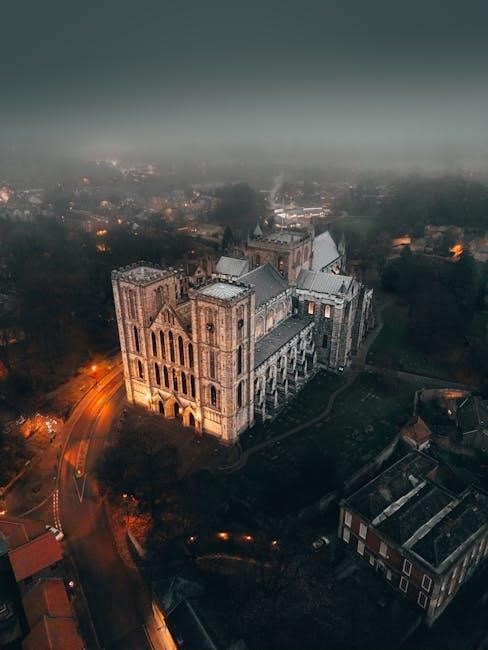Morning and Evening Azkar are sacred Islamic supplications‚ fostering a deep connection with Allah․ These daily remembrances offer spiritual growth‚ protection‚ and blessings‚ guiding believers through their day and night with gratitude and devotion․
Importance of Azkar in Islam
Azkar‚ or remembrances of Allah‚ hold a profound significance in Islam‚ serving as a means to strengthen one’s faith and foster a deeper spiritual connection․ Morning and Evening Azkar are particularly emphasized‚ as they provide believers with protection‚ blessings‚ and guidance throughout the day and night․ These supplications are rooted in the teachings of the Quran and Sunnah‚ offering a structured way to seek Allah’s mercy‚ forgiveness‚ and refuge from harm․ By incorporating Azkar into daily life‚ Muslims cultivate gratitude‚ humility‚ and mindfulness‚ which are essential for a righteous and balanced lifestyle․ Regular recitation also brings tranquility to the heart and strengthens one’s resolve to adhere to Islamic principles․ The practice is further enriched by the contributions of Islamic scholars‚ such as Shaykh Abdul Aziz At-Tarefe‚ who have compiled authentic and concise collections of these supplications for ease of practice․

Overview of Morning and Evening Azkar
Morning and Evening Azkar are specific supplications and remembrances prescribed in Islam to be recited at particular times of the day․ These Azkar are designed to help believers maintain a constant connection with Allah‚ seeking His protection‚ guidance‚ and blessings․ The morning Azkar are typically recited after the Fajr prayer‚ between dawn and sunrise‚ while the evening Azkar are recited between the Asr and Maghrib prayers․ They include a series of concise supplications‚ such as seeking refuge from evil‚ expressing gratitude for blessings‚ and invoking Allah’s mercy․ These practices are deeply rooted in Islamic tradition and are recommended to ensure a righteous and balanced lifestyle․ By adhering to these prescribed times and supplications‚ believers can cultivate a sense of spiritual discipline and mindfulness․ The structured nature of these Azkar makes them accessible and easy to incorporate into daily routines‚ offering a meaningful way to begin and end each day with gratitude and devotion․

Benefits of Reciting Morning and Evening Azkar
Reciting Morning and Evening Azkar strengthens one’s faith‚ cultivates mindfulness‚ and brings peace․ These supplications provide divine protection‚ blessings‚ and gratitude‚ enhancing spiritual and emotional well-being daily․
Spiritual Benefits
Reciting Morning and Evening Azkar fosters a profound connection with Allah‚ nurturing spiritual growth and enlightenment․ These supplications strengthen one’s faith‚ creating a sense of accountability and divine closeness․ By consistently practicing Azkar‚ believers cultivate mindfulness of Allah’s presence‚ fostering humility and gratitude․ The regular recitation of these prayers also increases divine love and reliance on Allah‚ providing spiritual protection from evil influences․ Moreover‚ Azkar serves as a reminder of Allah’s mercy and blessings‚ encouraging believers to seek forgiveness and guidance․ This spiritual practice becomes a shield against negativity‚ promoting inner peace and a deeper understanding of Islam’s teachings․ Ultimately‚ Morning and Evening Azkar are essential for maintaining a strong spiritual foundation‚ helping believers navigate life’s challenges with faith and confidence․
Emotional and Mental Well-being
Reciting Morning and Evening Azkar significantly enhances emotional and mental well-being by fostering a sense of inner peace and stability․ These supplications act as a shield against stress‚ anxiety‚ and negative thoughts‚ providing comfort and emotional balance․ By focusing on Allah’s mercy and blessings‚ believers cultivate gratitude‚ which strengthens their mental resilience․ The consistent practice of Azkar helps individuals manage life’s challenges with patience and optimism‚ reducing feelings of overwhelm․ Additionally‚ the recitation of these prayers fosters self-awareness and emotional regulation‚ enabling believers to navigate daily struggles with calmness and clarity․ The rhythmic and meaningful nature of Azkar also promotes mindfulness‚ further enhancing mental well-being․ Overall‚ incorporating these supplications into one’s routine serves as a powerful tool for maintaining emotional stability and mental harmony in a fast-paced and often stressful world․

Morning Azkar: A Detailed Guide
Morning Azkar are sacred supplications recited at dawn‚ offering protection‚ blessings‚ and peace․ They include specific duas and Quranic verses‚ providing a spiritual foundation to start the day with gratitude and divine connection․

Recommended Times for Recitation
The ideal time for reciting Morning Azkar is between Fajr (dawn) and sunrise‚ as this period is considered sacred and highly rewarded․ It is advisable to start immediately after the Fajr prayer to seeking Allah’s blessings and protection for the day․ For those unable to recite during this window‚ the supplications can be performed later‚ though the earlier the better․ Similarly‚ Evening Azkar should be recited between Asr and Maghrib‚ as this transition marks the end of the day and prepares one for the night ahead․ Consistency in these timings helps cultivate a strong spiritual routine‚ fostering a deeper connection with Allah․ Starting the day with Morning Azkar and concluding with Evening Azkar creates a balanced and mindful approach to worship‚ ensuring one remains guided and protected throughout․
Key Morning Azkar and Their Meanings

Among the key Morning Azkar is the supplication أَعُوذُ بِكَلِمَاتِ اللَّهِ التَّامَّاتِ مِنْ شَرِّ مَا خَلَقَ (“I seek refuge in the perfect words of Allah from the evil of what He has created”)‚ which seeks protection from harm․ Another essential supplication is بِسْمِ اللَّهِ الرَّحْمَٰنِ الرَّحِيمِ (“In the name of Allah‚ the Most Gracious‚ the Most Merciful”)‚ invoking divine mercy․ The Quranic verse وَمَا خَلَقْتُكُمْ إِلَا لِيَعْبُدُونِ (“I have not created jinn and men except that they may worship Me”) reminds one of their purpose․ Reciting اللَّهُ لَا إِلَٰهَ إِلَّا هُوَ الْحَيُّ الْقَيُّومُ (“Allah! There is no deity except Him‚ the Ever-Living‚ the Sustainer of existence”) reinforces faith in Allah’s oneness․ These supplications are not only acts of worship but also a means of seeking blessings‚ guidance‚ and protection for the day ahead․
Evening Azkar: A Comprehensive Overview
Evening Azkar are essential Islamic supplications recited at sunset‚ offering blessings‚ protection‚ and a sense of gratitude․ They conclude the day with worship‚ reinforcing faith and seeking Allah’s mercy and guidance․

Significance of Evening Azkar
Evening Azkar holds profound significance in Islam‚ serving as a spiritual shield and a means of seeking Allah’s blessings․ Recited at sunset‚ these supplications foster a sense of gratitude and humility‚ concluding the day with worship․ They offer protection from evil‚ guidance‚ and divine mercy‚ reinforcing one’s faith and connection with Allah․ The practice is deeply rooted in Islamic tradition‚ with specific supplications recommended to ensure safety‚ forgiveness‚ and spiritual growth․ Many Evening Azkar involve seeking refuge from harm‚ expressing thanks for blessings‚ and seeking guidance for the night ahead․ They also provide emotional and mental comfort‚ helping believers reflect on their deeds and seek improvement․ The recommended time for Evening Azkar is between Asr and Maghrib‚ though they can be recited later if missed․ This practice is a beautiful way to end the day‚ fostering peace and mindfulness while seeking Allah’s continued favor and protection․

Key Evening Azkar and Their Blessings

Among the key Evening Azkar are supplications that offer profound blessings and protection․ One of the most significant is seeking refuge from evil‚ expressed as: “أَعُوذُ بِكَلِمَاتِ اللَّهِ التَّامَّاتِ مِنْ شَرِّ مَا خَلَقَ” (I seek refuge in Allah’s perfect words from the evil of what He has created)․ This supplication is a powerful shield against harm and negativity․ Another essential Evening Azkar is expressing gratitude: “اللَّهُمَّ أَنْتَ السَّلَامُ وَمِنْكَ السَّلَامُ، تَبَارَكْتَ يَا ذَا الْجَلَالِ وَالْإِكْرَامِ” (O Allah‚ You are the Source of Peace‚ and from You comes peace․ Blessed are You‚ O Possessor of Majesty and Honor)․ Reciting these azkar fosters a sense of gratitude and humility‚ while also seeking divine protection and blessings․ Regular recitation of Evening Azkar is believed to bring peace‚ forgiveness‚ and guidance‚ helping believers end their day on a note of worship and devotion․ These supplications are a beautiful way to connect with Allah‚ ensuring spiritual growth and tranquility․